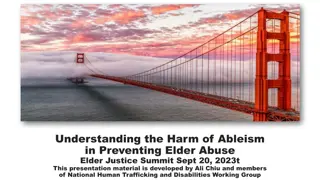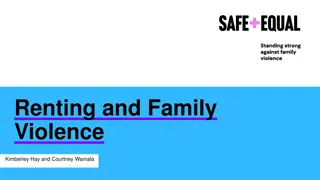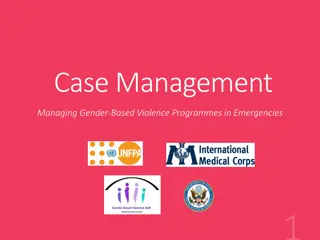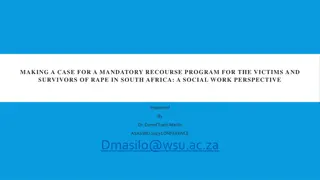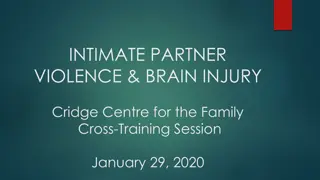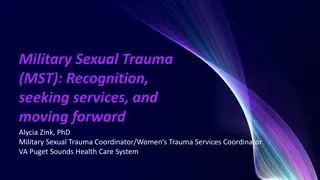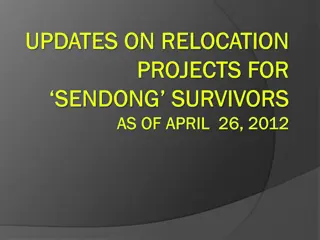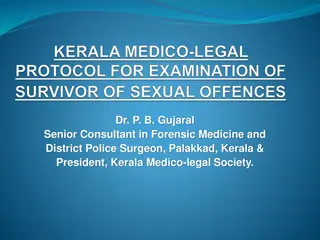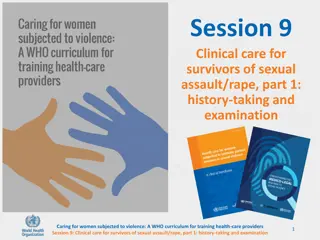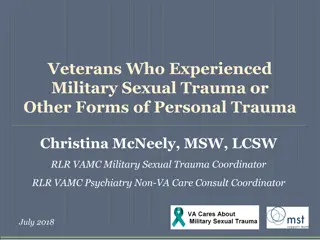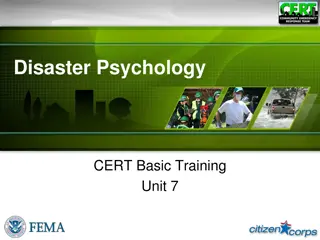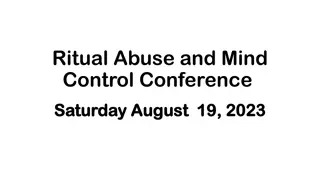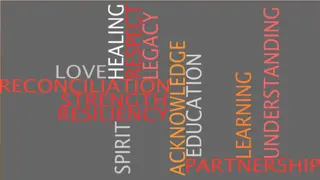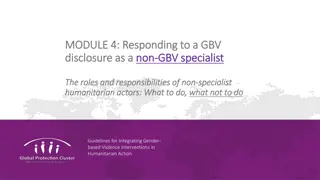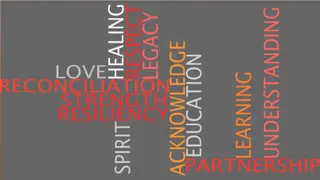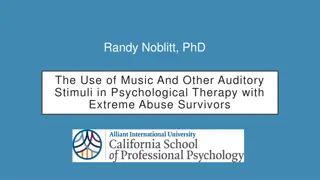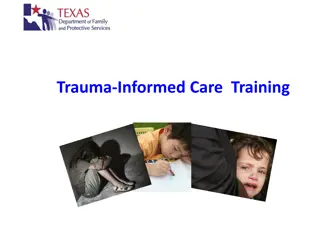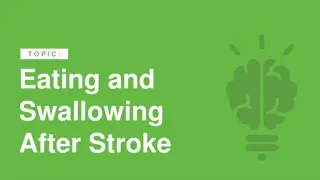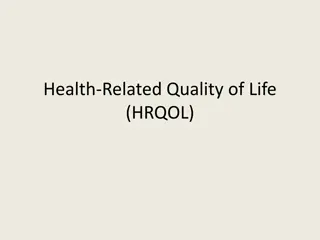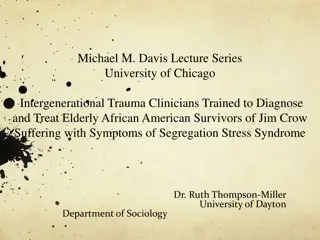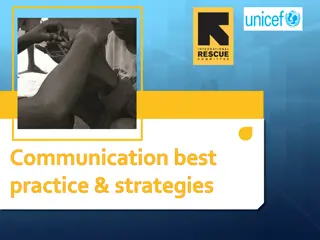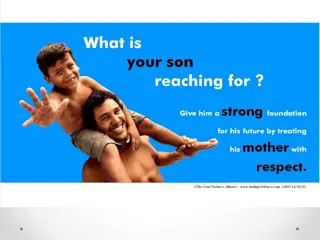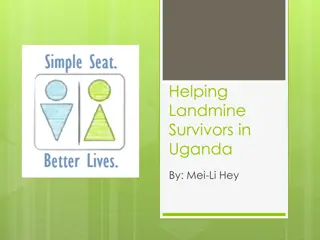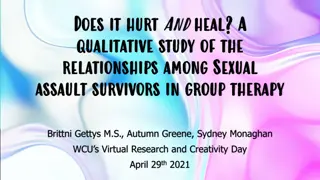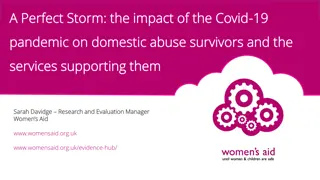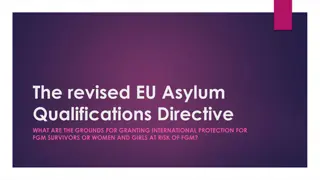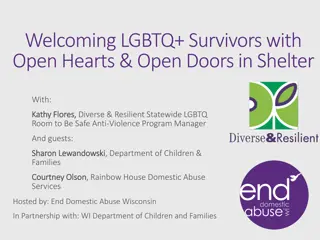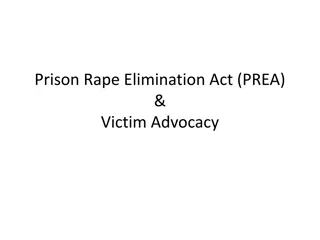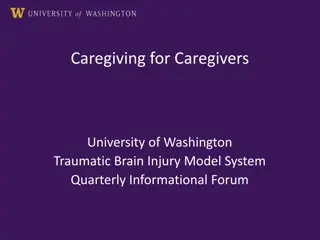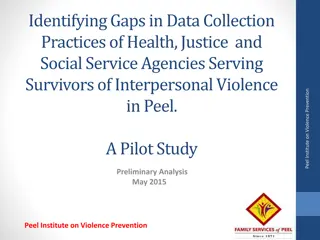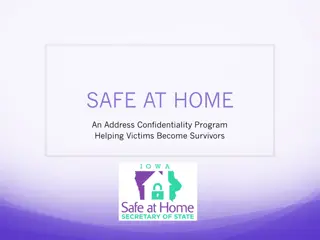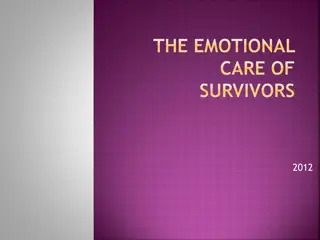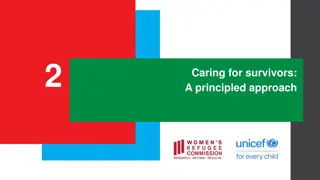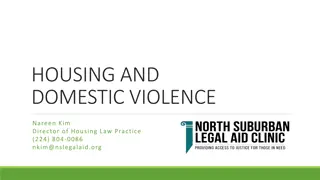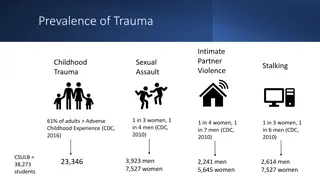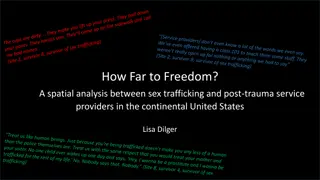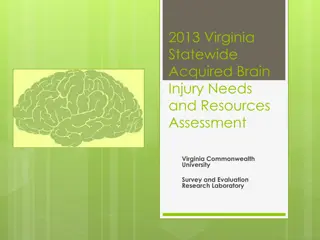Understanding the Impact of Ableism in Elder Abuse Prevention
This presentation focuses on the harm of ableism in preventing elder abuse, presented by Ali Chiu at the Elder Justice Summit. The material covers key training objectives such as exploring the history of disability in the U.S., understanding ableism, and discussing tools for responding to abuse repo
1 views • 19 slides
Understanding and Addressing Domestic Violence, Dating Violence, Sexual Assault, and Stalking
This training series focuses on raising awareness about domestic violence, dating violence, sexual assault, and stalking. Participants will learn how to recognize crisis and trauma, respond appropriately to disclosures, and create supportive environments for survivors. The sessions cover key topics
1 views • 76 slides
Impact of Family Violence on Housing and Support Services in Victoria
Family violence is a significant factor leading to homelessness in Victoria, particularly affecting women and young individuals. Safe at Home programs provide victim-survivors with support to remain in their homes while the perpetrator is removed. Brokerage services, such as flexible support package
5 views • 24 slides
Gender-Based Violence Case Management in Emergencies: Principles and Process
Gender-Based Violence (GBV) case management in emergencies involves a structured approach to supporting survivors by ensuring informed decision-making, identification of issues, and emotional support. The process prioritizes survivor empowerment, individualized service delivery, and coordination. Ke
5 views • 73 slides
Mandatory Recourse Program for Rape Survivors in South Africa: Social Work Perspective
Addressing the alarming rates of rape and sexual violence in South Africa, this paper advocates for the implementation of a mandatory recourse program to support victims and survivors. Highlighting the current lack of mandatory support for survivors, it emphasizes the importance of immediate recours
1 views • 10 slides
Understanding Intimate Partner Violence and Brain Injury Connections
The link between intimate partner violence (IPV) and brain injury is significant, with studies showing a high prevalence of brain injuries among IPV survivors, particularly women. Common types of IPV causing brain injury include hits to the head, strangulation, and banging the head against objects.
1 views • 23 slides
Understanding Military Sexual Trauma (MST) and Supporting Survivors
This presentation by Dr. Alycia Zink delves into Military Sexual Trauma (MST), covering definitions, statistics, unique aspects in military settings, common reactions like PTSD, and available mental health treatments for survivors. Participants will gain insight into recognizing MST, understanding s
0 views • 39 slides
Update on Sendong Survivors' Relocation Projects as of April 26, 2012
Ongoing relocation projects for Sendong survivors include developments in Bayanihan sa Iligan Village, Deus Caritas Est Village, Kapuso Village, Red Cross Village, Iligan Eco Village, and Upper Hinaplanon Heights. The activities involve house constructions, land surveys, site development funds, wate
1 views • 11 slides
Comprehensive Approach to Address Sexual Offences: Insights from Dr. P. B. Gujaral
Dr. P. B. Gujaral, a Senior Consultant in Forensic Medicine, highlights the significant impact of sexual offences, emphasizing the need for a thorough medico-legal examination and comprehensive care for survivors. He discusses the existing protocols, identifying fatal mistakes, and the evolution of
0 views • 10 slides
Clinical Care for Survivors of Sexual Assault/Rape: History-Taking and Examination
This session focuses on providing clinical care for survivors of sexual assault/rape, emphasizing the importance of history-taking, examination, and appropriate responses. Key aspects include taking a thorough history, conducting physical and forensic examinations when necessary, offering necessary
0 views • 16 slides
Understanding Military Sexual Trauma (MST) and Supporting Veterans
This presentation by Christina McNeely provides valuable insights into military sexual trauma (MST) experienced by veterans, highlighting the definitions, prevalence, impacts, and the VA's response. It explores how MST differs from other traumas, addresses the needs of survivors during the claims pr
0 views • 35 slides
Understanding Disaster Psychology and Rescuer Well-Being
Explore the key concepts of disaster psychology, focusing on the emotional environment of survivors and rescuers. Discover ways rescuers can alleviate stress for themselves and survivors. Learn about symptoms of trauma, both psychological and physiological, and actions to enhance team well-being bef
0 views • 22 slides
Understanding Ritual Abuse and Survivor Support: A Historical Perspective
Explore the history of ritual abuse and its effects on survivors through the lens of social movements. Learn from Neil Brick's insights on survivor support systems and recovery. Delve into key periods in the history of child and ritualistic abuse, shedding light on the brutal nature of these crimes
1 views • 88 slides
Understanding Orange Shirt Day: Commemorating Residential School Survivors
Orange Shirt Day is a national initiative in Canada that aims to honor survivors of Indian Residential Schools and remember those who did not return home. The movement began in 2013 and encourages Canadians to wear orange shirts on September 30 as a gesture of healing and reconciliation. Phyllis Web
0 views • 18 slides
Guidelines for Survivor-Centered Approach in Responding to Gender-Based Violence
Survivor-centered approach in responding to gender-based violence focuses on creating a supportive environment where survivors' rights are respected, promoting recovery, reinforcing decision-making capacity, and ensuring dignity and respect. It involves addressing victim-blaming attitudes, empowerin
0 views • 28 slides
Overcoming Barriers to Disclosure of Sexual Violence
Understanding the barriers to disclosing sexual violence is crucial in providing support to survivors. Common obstacles include self-blame, fear of not being believed, and concerns about judgment from others. This case study illustrates challenges faced by a woman who was sexually assaulted and high
3 views • 9 slides
Understanding Orange Shirt Day: Honoring Residential School Survivors
Orange Shirt Day is a national movement in Canada to recognize and honor the experience of students of Indian Residential Schools. It began in 2013 to acknowledge survivors and remember those who did not return home. Phyllis Webstad's story of losing her orange shirt at a residential school highligh
1 views • 18 slides
The Use of Music and Auditory Stimuli in Psychological Therapy with Extreme Abuse Survivors
Extreme abuse survivors often find solace and emotional regulation through music and other auditory stimuli, which can evoke various responses such as containment, identity switching, and flashbacks. Despite being less discussed in clinical literature, these stimuli play a crucial role in therapy wi
0 views • 27 slides
Understanding Trauma-Informed Care Training
Trauma-Informed Care Training involves understanding child traumatic stress, recognizing the effects of trauma on child development, behaviors, and functioning, as well as preventing and coping with Compassion Fatigue. It emphasizes creating safety for both providers and survivors and empowering sur
0 views • 55 slides
Managing Eating and Swallowing Challenges After Stroke
Dysphagia, a common issue after a stroke, can lead to difficulty swallowing and may require texture modifications in food and fluids for safety. Up to 65% of stroke survivors may experience dysphagia, which can lead to complications like pneumonia. Proper oral care, mealtime positioning, and awarene
0 views • 9 slides
Understanding Health-Related Quality of Life (HRQOL) in Young Adults with Cancer
The Health-Related Quality of Life (HRQOL) Working Group conducted a systematic review of literature since 2000 to focus on HRQOL in adolescents and young adults (AYAs) aged 15-39 years with cancer. The study identified gaps in physical, psychological, social, and spiritual/existential aspects, high
0 views • 27 slides
Intergenerational Trauma: Coping Strategies of Elderly African American Survivors of Jim Crow
Exploring coping strategies passed down by survivors of Jim Crow to the next generation, this qualitative research project conducted interviews with nearly 100 elderly African American survivors. Key findings reveal the long-term psychological impact of racially traumatic events and diverse coping m
0 views • 27 slides
Effective Communication Strategies for Engaging with Child Survivors of Sexual Abuse
Learn about the best practices and strategies for communication sessions aimed at engaging and communicating with child survivors of sexual abuse. Understand the importance of good communication, the challenges children may face post-abuse, and the consequences of using bad interview practices. Enha
0 views • 31 slides
Understanding the Safe and Together Model in Domestic Abuse Cases
Exploring the Safe and Together model in domestic abuse cases involving children, this content delves into perpetrator patterns, system responses, and the impact on survivors. It discusses the cardinal question of whether survivors perceive the system as supportive. The continuum of domestic violenc
0 views • 23 slides
Assisting Landmine Survivors in Uganda: Mei-Li Hey's Initiative
Mei-Li Hey spearheads a project in Uganda to help landmine survivors facing challenges with pit latrines by designing portable and affordable assistive devices. This initiative aims to address sanitation issues and social stigma faced by handicapped individuals, ultimately impacting the disabled com
0 views • 16 slides
Healing Together: Understanding Relationships Among Sexual Assault Survivors in Group Therapy
Qualitative study delves into the relationships among sexual assault survivors in group therapy, exploring how social support and shared trauma impact their healing processes. The study aims to uncover beneficial factors, coping mechanisms, and the effects of vicarious traumatization in a virtual th
0 views • 14 slides
Impact of Covid-19 on Domestic Abuse Survivors and Support Services
Domestic abuse, a pattern of controlling and coercive behavior within intimate or family relationships, has been exacerbated by the Covid-19 pandemic. Abusers have used the pandemic to further manipulate and control survivors, leading to increased isolation and fear. Women experiencing domestic abus
0 views • 9 slides
Grounds for Granting International Protection to FGM Survivors
The revised EU Asylum Qualifications Directive clarifies grounds for granting international protection to FGM survivors and those at risk. Women and girls facing persecution or the threat of FGM are eligible for protection. Gender-based persecution, particularly on the basis of FGM, must be consider
0 views • 12 slides
Supporting LGBTQ+ Survivors with Open Hearts and Open Doors
Diverse & Resilient, a Wisconsin-based organization, aims to achieve health equity and enhance the safety of LGBTQ individuals and communities. They provide a safe space and resources for survivors, including a hotline for LGBTQ support and safety planning. The organization emphasizes understanding
0 views • 51 slides
Understanding the Prison Rape Elimination Act (PREA) and Victim Advocacy
The Prison Rape Elimination Act (PREA) is the first federal law addressing sexual violence in detention facilities, setting standards for prevention and response. It requires compliance from various facilities and emphasizes access to victim advocacy services, outlining the roles and boundaries of a
0 views • 11 slides
Understanding Caregiving for Traumatic Brain Injury Survivors
Caregiving for individuals with Traumatic Brain Injury (TBI) is a crucial yet challenging role undertaken by family members or friends. The responsibilities can be overwhelming, impacting both the survivor and the caregiver's well-being. This presentation highlights the needs of caregivers, survivor
0 views • 22 slides
Analysis of Data Collection Practices for Interpersonal Violence Services in Peel
The Peel Institute on Violence Prevention conducted a pilot study in May 2015 to identify gaps in data collection practices of health, justice, and social service agencies serving survivors of interpersonal violence in the Peel region. The study aimed to understand service availability, standardize
0 views • 38 slides
A Confidentiality Program Helping Victims Become Survivors
Safe at Home is an address confidentiality program aiding victims of domestic abuse, sexual assault, trafficking, and violent crimes to transition into survivors. It offers services like Substitute Address, Mail Forwarding, and Confidential Voter Registration. Eligible individuals can apply, includi
0 views • 36 slides
Supporting Emotional Well-being in Disaster Survivors: Resources and Training
Explore resources from the Missouri Department of Mental Health for providing emotional care to disaster survivors. Learn about stress responses, training programs like Psychological First Aid, and access web resources for disaster readiness. Contact Jenny Wiley, Coordinator of Disaster Services, fo
0 views • 8 slides
Empowering Survivors: A Principled Approach Through Self-Reflection and Values Clarification
Empower survivors by debunking myths, promoting self-reflection, and adopting a survivor-centered approach. Understand the influence of personal values, biases, and behaviors in supporting survivors' recovery and agency. Embrace neutrality, self-awareness, and survivor-centric actions to ensure dign
0 views • 23 slides
Understanding Subsidized Housing Programs for Domestic Violence Survivors
Domestic violence often leads to housing instability, making it crucial for survivors to access safe housing. This article explores the intersection between domestic violence and housing, highlighting the barriers faced by survivors. It delves into the importance of subsidized housing programs, such
0 views • 34 slides
Understanding Trauma and Social Reactions in Cases of Violence
This content highlights the prevalence of trauma, including intimate partner violence, childhood trauma, sexual assault, and stalking. It discusses disclosures to friends and family, social reactions survivors may face, victim blame, and the importance of providing support and understanding to survi
0 views • 10 slides
Spatial Analysis of Sex Trafficking and Post-Trauma Service Providers in the United States
This study delves into the spatial relationship between sex trafficking and post-trauma service providers in the continental United States. It highlights concerning statistics on human trafficking, survivors' needs, and the critical role of non-profit organizations in supporting survivors. The resea
0 views • 11 slides
Challenges Faced by Immigrant Survivors of Domestic Violence in Accessing Legal Immigration Status
Immigrant survivors of domestic violence encounter numerous barriers in accessing lawful immigration status. This presentation covers key aspects such as the Violence Against Women Act (VAWA), U-visa eligibility, available resources, basic immigration facts, pathways to legal permanent residence, st
0 views • 26 slides
Virginia Statewide Acquired Brain Injury Assessment 2013
This report conducted by Virginia Commonwealth University aimed to assess the needs and resources for individuals with acquired brain injuries (ABI) in Virginia. The study identified service needs, gaps, and available resources for ABI survivors and their families/caregivers. Data was gathered throu
0 views • 26 slides
